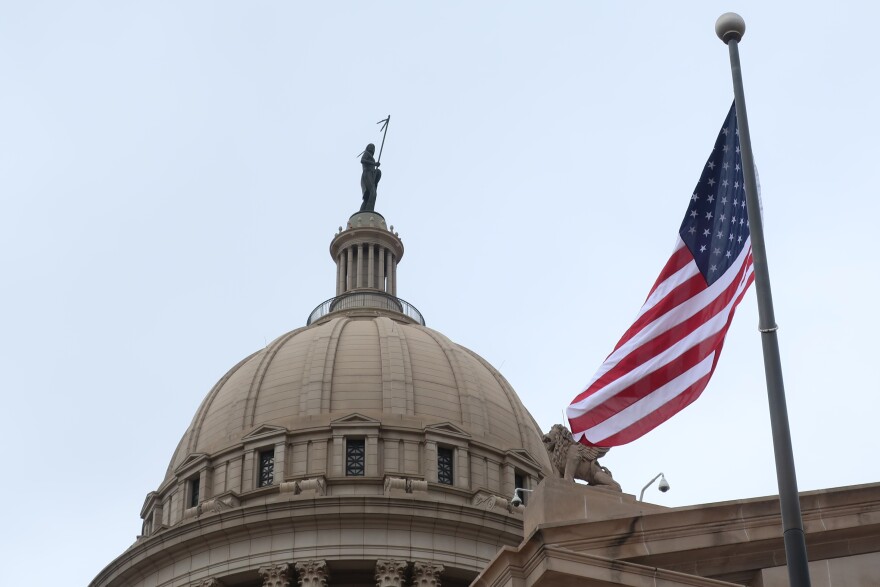Because of an increase in federal funding, Oklahoma’s Medicaid agency is sitting on more than half a billion dollars in extra money. Lawmakers want to spend that on normal Medicaid operations, and it’s looking like they’re going to get their way.
The Senate voted Wednesday to override a veto and force through their plan to spend the money.
Gov. Kevin Stitt has advocated safeguarding the money for longer-term health policy investments, but Senate Appropriations Chairman Roger Thompson argued the Legislature controls the state budget, not the governor’s office.
As of Wednesday night, the House hadn’t voted on the override yet.
Throughout the pandemic, the federal government was giving states extra money for Medicaid services. The Oklahoma Health Care Authority, which oversees the state’s Medicaid program, held onto that funding and put it in a special fund — kind of like a savings account. Gov. Kevin Stitt says the agency should get to hold onto the money and invest it in health initiatives.
Last week, lawmakers passed Senate Bill 1130. It orders the agency to empty that savings account and use it for normal operations. Health and Human Services Chairman Paul Rosino explained during one of the bill’s hearings, the measure would shore up money for the Legislature to spend elsewhere.
“And then we will now have $600 million back in the Legislature to use as we wanna,” he said.
The bill wasn’t controversial among lawmakers; it got only six no votes in its two floor hearings. But on Tuesday evening, Stitt announced he’d vetoed the measure. He argued the surplus should go toward investing in Oklahoma’s health outcomes and not everyday Medicaid expenses.
“This bill would punish the Health Care Authority for its fiscal conservatism and wise stewardship of taxpayer dollars,” his veto message reads in part. “That's simply wrong.”
Unwinding period
Stitt notes that a major federal pandemic relief program for Medicaid recipients ended recently.
Through most of the pandemic, states weren’t allowed to disenroll members from Medicaid after they became ineligible. Medicaid eligibility is mostly based on income. So if someone starts making a little too much money, they stop qualifying. People can also lose eligibility because of missing paperwork. That policy ended this spring, but Oklahoma has chosen to drop people in cohorts slowly throughout the year instead of kicking 300,000 Oklahomans off the service at once. That slow rollout is called an unwinding period.
“At the very least, then, decisions to pull this surplus from the Health Care Authority should be delayed until 2024, or after the unwinding period,” Stitt wrote.
During the veto override hearing, Thompson said that the agency’s budget already includes that unwinding period and has the funding it needs for that process.
“The disenrolling of 300,000 has already been taken care of,” he said.
"Sweeping" funds
In past bad budget years, lawmakers have depended on emptying similar savings accounts to balance the budget. The practice can be controversial, and it is often called “raiding” or “sweeping” funds.
In his veto message, Stitt accused lawmakers of sweeping the Health Care Authority’s fund with SB 1130. Thompson argued on the floor that isn’t the case.
“We did not sweep it,” he said. “It’s still with the health care authority.”
Oklahoma hasn’t struggled to pay for its services over the past few years, so this practice hasn’t been front and center. But after a 2014 oil and gas downturn, public finance was a disaster. It was common for the Legislature to meet at the beginning of the year and find out that projections were wrong, and they needed to cut $1 billion in spending. Lawmakers would take money from revolving funds, place it into the state’s special cash fund, and then use that money to build the annual budget.
At that time, raiding revolving funds became standard practice. State agencies create revolving funds to act like savings accounts — similar to the way the Health Care Authority created the fund for that $600 million in federal surplus. Agencies depend on those funds to save up money for ongoing projects. For example, the Oklahoma Corporation Commission had a fund that paid for its program to plug abandoned wells. There is also a fund to help pay for rural county roads. Both were raided during the downturn years.
_
Copyright 2023 KOSU. To see more, visit KOSU. 9(MDA4OTAxNzAzMDEzMjc0MTc2MzA5ZDZlMw004))







